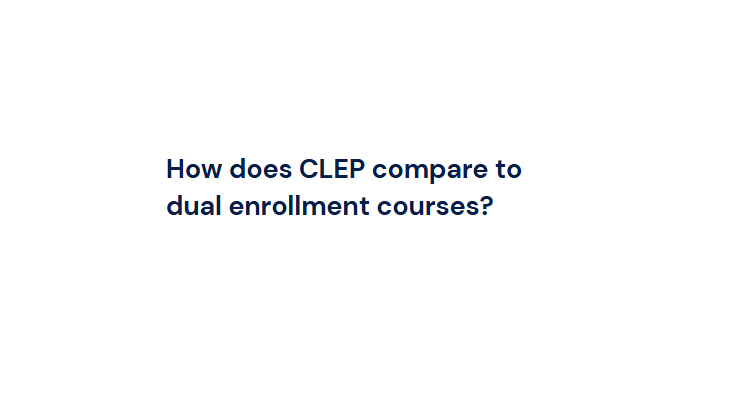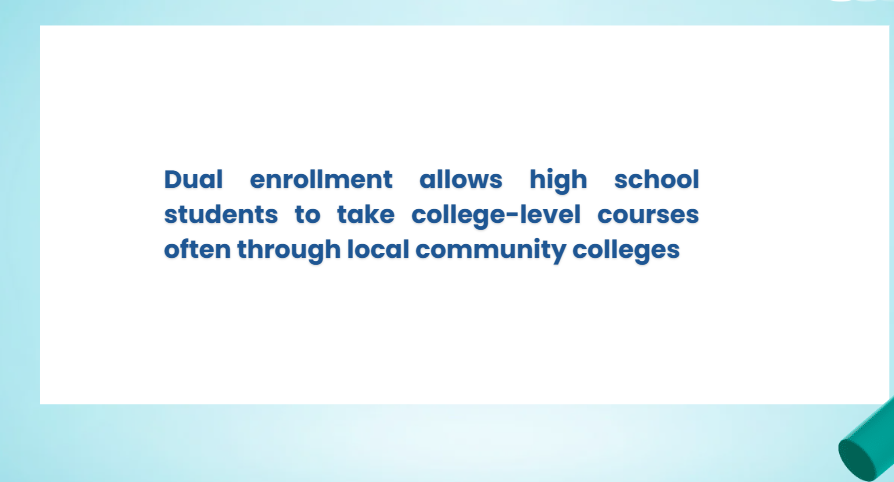If you're a high school or college student looking to get ahead, you've probably come across two popular options: CLEP exams and dual enrollment courses. Both paths offer a chance to earn college credit early, save time, and reduce tuition costs—but how do they really compare?
We help students navigate the college credit maze by providing expert guidance and exam support for CLEP. In this guide, we’ll break down everything you need to know about CLEP vs. dual enrollment, so you can make the best choice for your academic goals.
What Is CLEP?
The College-Level Examination Program (CLEP) is a set of standardized exams created by the College Board that allows students to earn college credit by demonstrating proficiency in subjects like College Algebra, U.S. History, English Composition, and more.
CLEP is ideal for:
-
Self-motivated students
-
Adult learners or military members
-
Homeschoolers or students with strong subject knowledge
Most CLEP exams are 90 minutes long and cost around $93 (plus any testing center fees). Over 2,900 colleges and universities accept CLEP credits toward general education or elective requirements.
What Is Dual Enrollment?
Dual enrollment allows high school students to take college-level courses often through local community colleges while still in high school. These courses count toward both high school graduation and future college credit.
Dual enrollment is perfect for:
-
Students seeking classroom-based college experience
-
Those who prefer a structured learning environment
-
Students planning to attend in-state colleges that support credit transfers
Dual enrollment courses follow a semester schedule, usually cost less than full tuition, and offer high schoolers a preview of college coursework and expectations.
CLEP vs. Dual Enrollment: Head-to-Head Comparison
|
Feature |
CLEP Exams |
Dual Enrollment Courses |
|---|---|---|
|
Time Commitment |
1-day exam |
Semester-long course |
|
Cost |
~$93 per exam |
Varies, often free or reduced |
|
Location |
Test centers or online |
Local colleges or high schools |
|
Credit Transferability |
Accepted by 2,900+ colleges |
Varies by state and institution |
|
Learning Style |
Self-study |
Instructor-led |
|
Flexibility |
Test anytime |
Fixed schedule |
Which One Is Better for You?
The answer depends on your learning style, schedule, and college plans.
Choose CLEP if:
-
You’re great at studying independently
-
You already know the subject and want to test out
-
You need flexibility in scheduling
-
You want to earn credits quickly
Choose Dual Enrollment if:
-
You want regular classroom interaction
-
You prefer a paced learning experience
-
You’re attending a local college that accepts credits easily
CLEP gives you the power to move at your own pace. You can study in a week or a month it’s up to you. With dual enrollment, you commit to a college-level class over several months with homework, exams, and participation requirements.
Why More Students Choose CLEP with TakeMyCLEPExam.com
While CLEP offers more flexibility and speed, it also puts more responsibility on you to prepare and pass the exam. That’s where we come in.
We offer:
-
Expert CLEP exam takers who will help you pass stress-free
-
Personalized CLEP prep support tailored to your subject
-
Secure, confidential services so your information is always protected
-
Time-saving solutions if you’re juggling school, work, or family life
If you're wondering, "Can someone help me with my CLEP exam?" you’re in the right place.
Frequently Asked Questions (FAQs)
1. Is CLEP easier than dual enrollment?
CLEP can be easier for students who already know the subject or who are confident test-takers. It eliminates homework, group projects, and class participation. However, it requires focused self-study and solid test prep.
2. Will my CLEP credits transfer to any college?
Most CLEP exams are accepted by over 2,900 colleges, but policies vary. Always check your target school’s credit acceptance chart before registering.
3. Can I take both CLEP and dual enrollment courses?
Absolutely. Many students use a mix of both to maximize their credit opportunities. Just be sure not to overlap subjects that may not allow duplicate credit.
4. Are CLEP exams harder than college classes?
They can be more challenging if you're not prepared. CLEP exams are multiple-choice and test core knowledge quickly. If you study well and use expert help (like us), you can pass with ease.
5. What if I fail a CLEP exam?
You must wait three months before retaking the same CLEP test. However, with our help, you can improve your odds and pass on the first try.
Ready to Fast-Track Your Degree?
If you're serious about getting ahead, CLEP can be your secret weapon especially when you partner with TakeMyCLEPExam.com. Whether you're short on time or just want expert support, we make the process fast, simple, and worry-free.
Let’s face it college is expensive and time-consuming. Why not earn credits the smarter way?
Visit TakeMyCLEPExam.com today to get started. Our team is standing by to help you ace your next CLEP exam and move one step closer to graduation.


